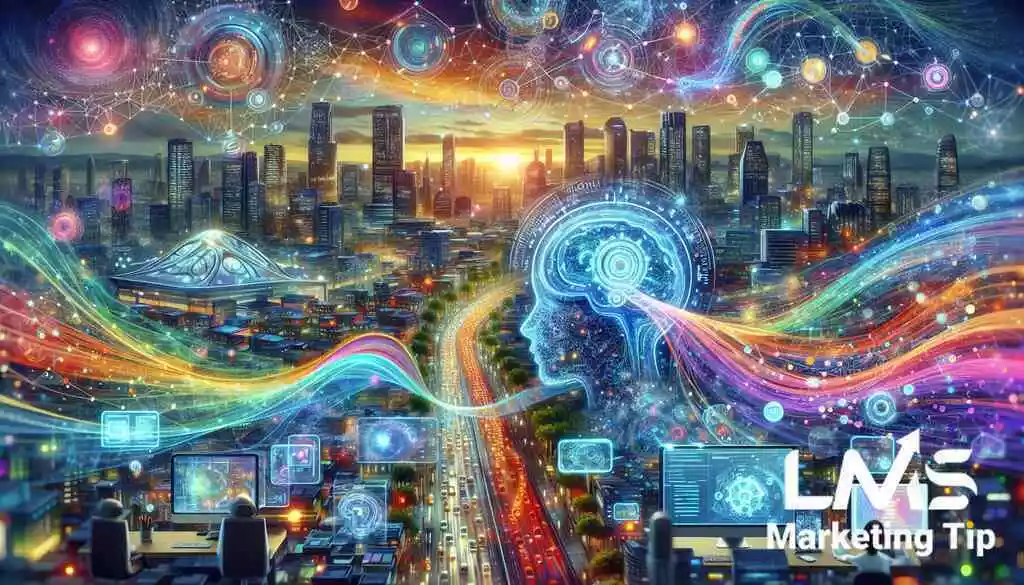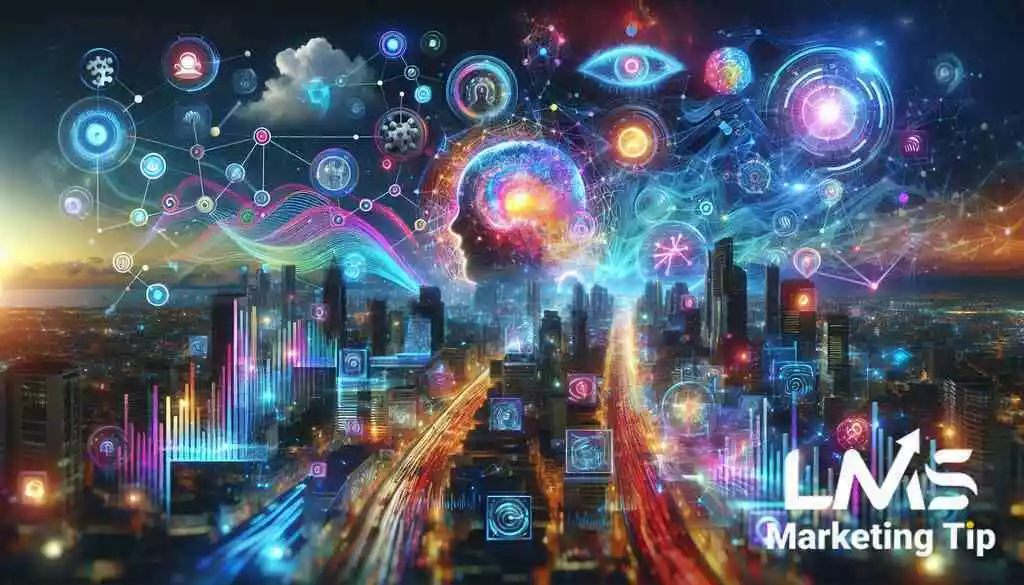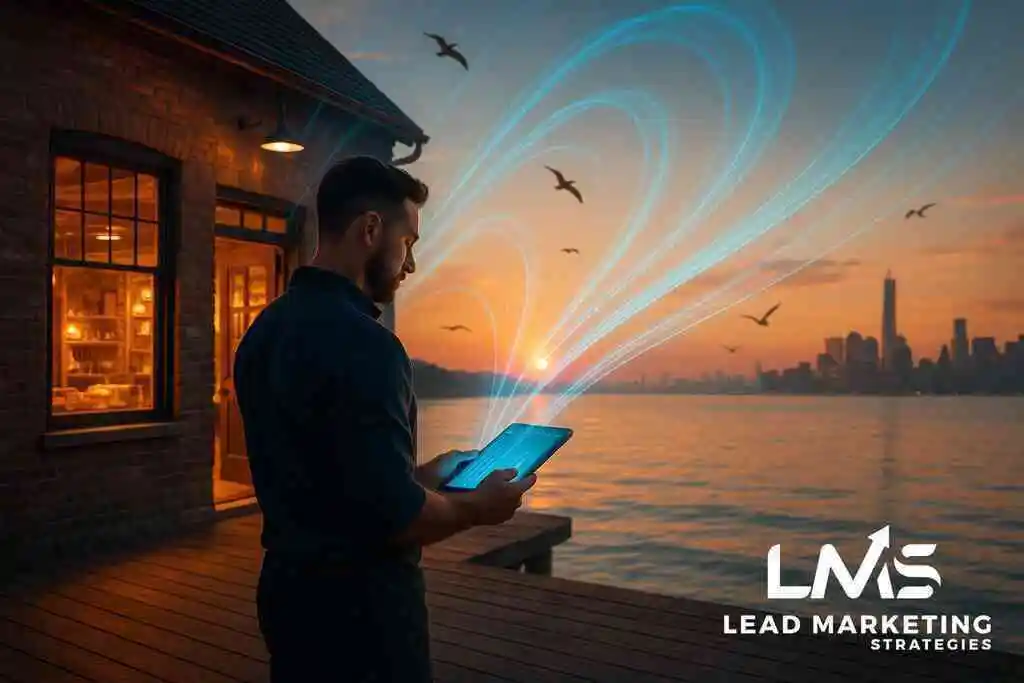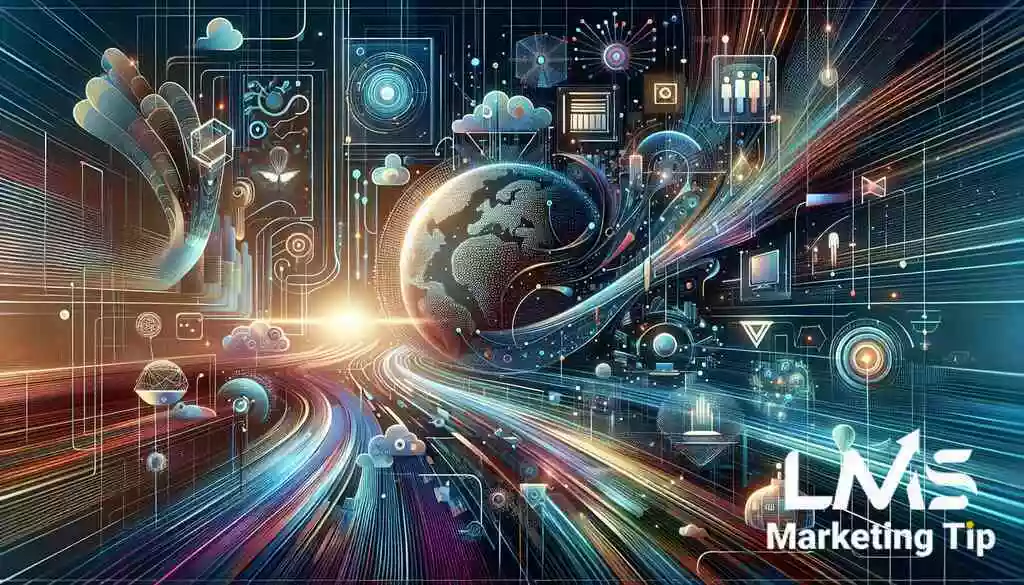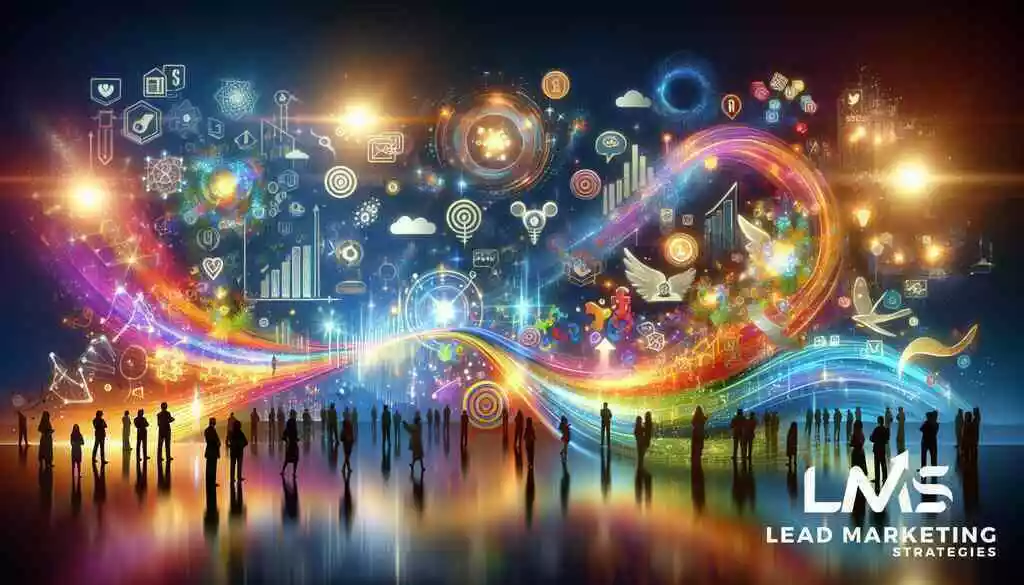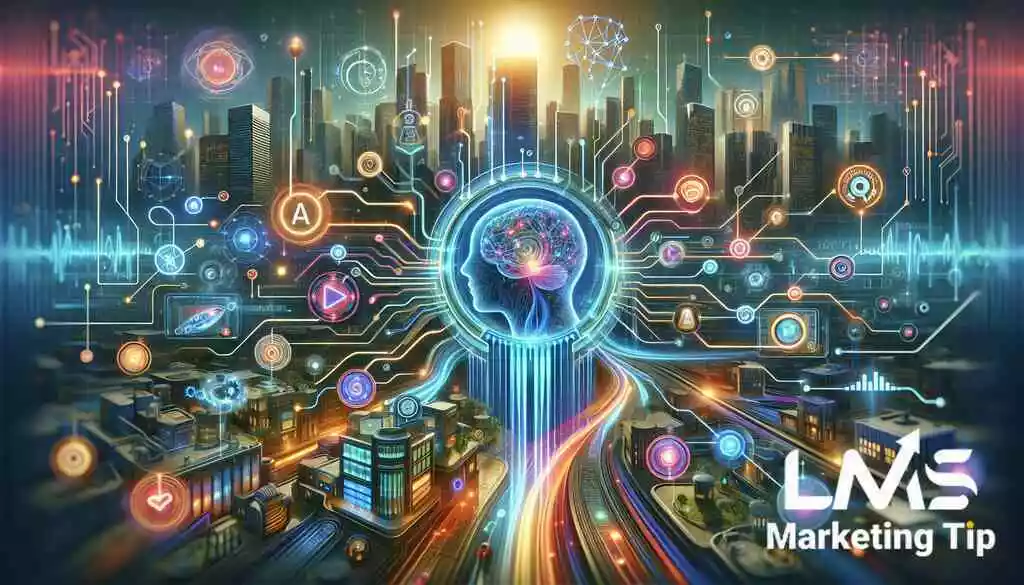
Unveiling the AI Revolution in Marketing
The Rise of AI-Driven Marketing Strategies
The marketing industry in 2025 is in the throes of a digital metamorphosis powered by AI marketing strategies for 2025. These next-generation strategies pivot on a foundation of advanced technologies that enable marketers to harness vast datasets like never before. With AI’s unparalleled ability to process and analyze, businesses are leveraging data-driven marketing to create highly personalized experiences that captivate their audience. The evolution of marketing strategies underscores the call for companies to embrace AI-driven methods that refine targeting, streamline operations, and foster customer engagement to unprecedented levels. Dive into What Defines Cutting-edge E-commerce Tactics in 2025?
AI Automation: Transforming Traditional Practices
Automation, traditionally applied to repetitive tasks, is revolutionizing how marketing operates by integrating into complex strategic frameworks in 2025. By automating marketing practices, AI removes time-consuming manual processes, allowing marketers to focus on creativity and strategy development. This shift towards automation facilitates smarter decision-making processes, eliminating human error and improving efficiency in marketing campaigns. As these AI-enhanced advertising techniques become more pervasive, they redefine the dynamics of targeting, engagement, and customer relationship management, transforming the marketing landscape.
Predictive Analytics: Shaping Future Marketing Decisions
Predictive analytics is at the frontier of future marketing strategies, providing insights that transcend traditional analytics’ scope. By leveraging powerful algorithms, marketers can foresee trends and anticipate consumer behaviors with remarkable precision. This visionary approach to marketing strategy uses historical data alongside innovative technologies to predict outcomes, thus enhancing decision-making capabilities. With predictive analytics for marketing, businesses can adapt and pivot their strategies dynamically, ensuring they remain competitive in a rapidly-evolving digital market where real-time data interpretation is key to maintaining market relevance.
Harnessing AI for Enhanced Customer Engagement
Personalized Experience Through Machine Learning
In 2025, marketing strategies are being revolutionized by machine learning in marketing. This innovative technology empowers businesses to offer a tailor-made experience to their clientele. Check out Exploring Innovative Fashion Marketing Strategies in NY. Through analyzing user behaviors and preferences, machine learning algorithms create deeply personalized marketing experiences with AI that resonate with individual consumers. As brands increasingly adopt these methods, they unlock the power to enhance connectivity with their audience. Moreover, acquiring a granular understanding of customer preferences boosts retention, elevating such experiences beyond what traditional strategies could achieve.
Chatbot Innovations and Natural Language Processing
The landscape of customer interaction is evolving with chatbot innovations using AI, where Natural Language Processing (NLP) plays a pivotal role. These advanced chatbots, enabled by NLP, deliver seamless and human-like interactions, providing instant responses and support to customers. As businesses integrate these systems, they realize unparalleled efficiency in customer service. The shift towards AI-driven chat solutions enhances user satisfaction, ensuring consumers feel valued and understood. This evolution in client communication underlines a transformative trend in how businesses maintain continuous engagement through intelligent digital solutions.
AI-Powered Content Creation and Personalized Ad Targeting
In the realm of AI, content creation has reached new heights of sophistication, allowing brands to craft adaptive content powered by AI that dynamically aligns with audience interests. AI-driven tools analyze data to generate engaging content, saving significant time and effort traditionally associated with marketing initiatives. Furthermore, AI-enhanced advertising techniques revolutionize personalized ad targeting, enabling marketers to reach their target audience with unparalleled precision. By automating and customizing ads, businesses maximize the relevance and impact of their advertising campaigns, leading to superior engagement and conversion rates. This dual power of content creation and precise targeting transforms brand-customer interactions into impactful marketing successes.
Integrating Advanced Technologies in Marketing
The Role of Neural Networks and AI Sales Forecasting
In 2025, neural networks and AI sales forecasting are pivotal in transforming sales strategies within the digital marketing evolution. Neural networks process extensive datasets to uncover patterns, enhancing predictions related to consumer behavior and sales trends. This sophisticated approach allows businesses to fine-tune their marketing strategies, ensuring alignment with customer expectations. By integrating AI sales forecasting, companies can make data-driven decisions that boost their marketing precision and efficiency. This integration represents a shift from conventional methods, underscoring the importance of AI in achieving more accurate sales predictions and fostering a deeper understanding of market dynamics.
The incorporation of AI-driven tools in sales forecasting is revolutionizing how businesses approach marketing campaigns. These advanced marketing analytics offer insights beyond conventional analytics, driving more strategic decision-making processes. As AI continues to evolve, its role in enhancing predictive accuracy becomes undeniable, enabling marketers to anticipate fluctuations and respond proactively. This paradigm shift illustrates how neural networks and predictive analytics strengthen the strategic framework, promoting competitive advantages in an ever-evolving digital marketplace.
Augmented Reality and Voice Search Optimization in Marketing
Augmented reality (AR) and voice search optimization for marketers mark significant advancements in marketing tactics, offering immersive customer experiences. AR technology has opened new avenues for engagement by overlaying digital information in real-world environments, thus enriching consumer interactions with products or services. This capability empowers marketers to create compelling, experiential marketing tactics that enhance brand visibility and customer loyalty. As AR becomes more prevalent, its integration into marketing strategies allows businesses to connect with consumers on a sensory level, fostering deeper engagement and enhanced brand recall.
Concurrently, the rising trend of voice search optimization is reshaping how consumers interact with digital platforms. As voice-activated devices become more prevalent, optimizing for voice search becomes a critical component of SEO. By tailoring content to match natural language queries, marketers can ensure broader reach and improved ranking on search engines. This dual approach, combining AR and voice search optimization, offers a robust strategy that aligns seamlessly with contemporary consumer behaviors and preferences, ensuring businesses remain at the forefront of the digital age.
Programmatic Advertising: The AI Future of Ad Placement
Programmatic advertising is paving the way for the future of ad placement, leveraging AI to automate the buying and selling of ad space. This AI marketing strategies for 2025 approach streamlines the advertising process, making it more efficient and cost-effective. By employing machine learning algorithms, programmatic advertising ensures ads are delivered to the right audience at the right time, increasing engagement and ROI. This automated process eliminates manual bidding, reducing human error, and optimizing ad spend.
The implementation of AI in programmatic advertising not only enhances targeting accuracy but also allows for real-time adjustments based on consumer interactions. This dynamic capability ensures that advertising campaigns are continuously optimized for performance, keeping them relevant and impactful. As businesses increasingly adopt programmatic strategies, they benefit from heightened precision and scalability in ad placements, underscoring the transformative potential of AI in revolutionizing the advertising landscape.”} 전d
Charting a New Course: AI-Driven Insights and Analytics
Leveraging AI for Advanced Market Segmentation
In the dynamic landscape of digital marketing, leveraging AI for advanced market segmentation has become indispensable. By utilizing sophisticated algorithms, businesses can dissect vast datasets to identify distinct consumer segments, refining targeting to unprecedented levels of specificity. This granular approach enables brands to tailor content and offers that resonate with each segment, enhancing engagement and conversion rates. As marketers embrace these advanced techniques, they gain the ability to craft strategies that are not only more precise but also more aligned with consumer expectations. This evolution underscores how AI is reshaping market segmentation, offering a strategic advantage in a competitive environment.
Adaptive Content Marketing with AI
The era of adaptive content powered by AI is upon us, where marketing agility and adaptability are key to success. AI technology enables the creation of content that dynamically aligns with real-time consumer interactions and preferences. By continuously analyzing data, AI-driven systems can adjust content to maintain relevance and engagement effortlessly, ensuring it meets the evolving demands of the audience. This adaptability allows brands to stay ahead by delivering personalized experiences that foster stronger connections with their targets. The ability to adapt content in real time signifies a transformative leap in marketing, where AI empowers brands to enhance their narrative’s impact and reach.
Harnessing Data-Driven Insights for Real-Time Strategy Adjustments
Data-driven insights have become the cornerstone of effective marketing, and AI plays a crucial role in translating these insights into actionable strategies. By processing large volumes of data swiftly, AI enables marketers to make real-time adjustments to their strategies, fostering greater agility and responsiveness. This capability ensures that marketing efforts remain aligned with shifting market dynamics and consumer behaviors, maximizing impact and effectiveness. The integration of AI provides a competitive edge, allowing businesses to anticipate trends and pivot strategies swiftly, thus maintaining their market relevance. As the digital marketing realm continues to evolve, those harnessing AI-driven insights stand poised at the frontier of strategic innovation.
The Future Landscape: Navigating AI Innovations
AI-Enhanced Web Design: Reshaping User Experience
In 2025, Web design advancements with AI are radically transforming user experiences, blurring the lines between technology and aesthetics. By leveraging AI’s capabilities, businesses are crafting websites that dynamically respond to user behaviors, preferences, and interactions. This advancement in web design allows for the creation of visually captivating interfaces that are both intuitive and user-friendly. The incorporation of AI into web design streamlines processes like layout customization and content placement, ensuring sites are not only attractive but also optimized for performance and accessibility. These innovations elevate brand engagement, enabling companies to foster deeper connections with their target audience by delivering cohesive and immersive online experiences that adapt in real-time to user needs.
Developers now have access to AI-driven insights that inform design decisions, allowing for continuous optimization without extensive manual intervention. This shift reduces time and resources traditionally associated with maintaining and updating digital platforms, promoting operational efficiency. As consumer expectations grow increasingly sophisticated, adopting AI-enhanced web design becomes essential for staying competitive and relevant in the digital marketplace. The seamless fusion of AI technology into web design practices is setting new standards, positioning businesses at the forefront of a digital evolution that prioritizes user experience above all.
The Impact of AI on Brand Awareness and Advertising Campaigns
The landscape of advertising is undergoing an unprecedented transformation with the rise of AI’s involvement in advertising campaign transformations. AI technologies are enabling brands to design advertising initiatives that are not only innovative but also remarkably effective in terms of engagement and ROI. Machine learning algorithms analyze consumer data to fine-tune advertising messages, ensuring they resonate well with target audiences. By leveraging these insights, marketers can craft campaigns that are both targeted and personalized, significantly enhancing brand awareness and perception.
AI’s ability to adapt swiftly to consumer feedback ensures that campaigns remain dynamic, adjusting strategies in real-time to optimize effectiveness. Look into the Top 10 Innovations in SEO Dynamics with Marketing Tip. This capability represents a shift from traditional methods, where post-campaign analysis was the norm. Now, marketers can make ongoing adjustments, increasing the chances of campaign success. By embracing AI-driven methodologies, businesses can create a lasting impression on consumers, fostering brand loyalty and enhancing market presence. The integration of AI into advertising not only amplifies brand visibility but also sets the stage for more impactful consumer connections.
Innovating Real Estate and Auto Shop Marketing with AI
In 2025, the real estate and auto shop sectors are witnessing real estate innovations with AI, where AI is transforming traditional marketing practices. For real estate businesses, AI provides tools to offer immersive virtual tours using augmented reality, enabling potential buyers to explore properties in detail from the comfort of their homes. This technology revolutionizes how properties are marketed, enhancing the buying experience by providing personalized insights based on consumer preferences and search patterns. Such innovations make it easier for real estate agents to connect with clients on a deeper level, tailoring their offerings to match client needs accurately.
Similarly, the auto shop industry benefits from AI by automating customer service processes and providing predictive maintenance alerts. By utilizing AI algorithms, auto shops can predict when a vehicle will need servicing, thus offering timely reminders to clients. This proactive approach not only improves customer satisfaction but also builds trust, as clients appreciate the effort in extending the life of their vehicles. AI’s role in automating parts of the marketing strategy for real estate and auto shops increases operational efficiency and enhances customer engagement, setting new benchmarks for success in these industries. With these innovations, businesses can navigate the complexities of modern marketing with confidence and foresight, ensuring sustainable growth. As AI continues to reshape marketing landscapes, these sectors stand at the cusp of a new era defined by innovative strategies and advanced technological integration.
Concluding Remarks: Embracing the AI Transformation
Preparing for an AI-Infused Marketing Future
As we look towards 2025 and beyond, preparing for an AI-infused marketing future is not just advantageous-it’s essential. Businesses must actively invest in technology and training to harness the full potential of AI-driven marketing strategies. This includes integrating AI-powered customer insights into everyday processes to foster an environment of continuous learning and adaptation. By staying informed about the latest advancements, companies can ensure that they remain competitive in a landscape that is evolving at an unprecedented pace. Furthermore, embracing AI will allow businesses to optimize their operations, leading to more effective and efficient marketing campaigns that resonate with their target audience in novel ways.
Strategies for Long-Term Success in an AI-Driven World
To achieve long-term success in an AI-driven world, companies must adopt a proactive approach that focuses on innovation and flexibility. Developing robust AI strategies that include automation, predictive analytics, and personalization will enable businesses to capitalize on new opportunities. It’s crucial to align these marketing strategies with overall business goals and ensure they are scalable. Leveraging AI for advanced data analysis will provide valuable insights that guide strategic decision-making and help anticipate market trends. By fostering a culture of experimentation and openness to change, companies can adapt to shifts in consumer preferences and technological advancements, ensuring sustained growth and relevance.
The Human Element: Balancing Creativity with AI Precision
While AI offers remarkable precision and data-driven insights, the human element remains indispensable in marketing. Balancing creativity with AI capabilities requires a strategic focus on fostering human ingenuity alongside technological advancements. Creative processes-such as storytelling, branding, and crafting unique marketing narratives-still benefit from the emotional intelligence and innovation that humans bring. By integrating AI technologies to handle data-intensive tasks, marketers can focus on creative aspects that resonate more deeply with consumers. This synergy between AI precision and human creativity ensures campaigns are not only analytically robust but also emotionally compelling, forging stronger connections with audiences while maintaining a competitive edge in the market.
Frequently Asked Questions
Question: How can AI-powered advertising enhance my marketing strategy?
Answer: AI-powered advertising significantly improves marketing strategies by automating and personalizing ad placements. With AI’s ability to analyze consumer data, businesses can target their audience with greater precision, increasing engagement and conversion rates. By leveraging machine learning algorithms, programmatic advertising ensures that ads are delivered to the right audience at the right time, maximizing ROI. Marketing Tip offers insights into implementing AI-driven advertising strategies that align with your business goals, ensuring impactful and cost-effective marketing campaigns. See more on Exploring NY’s Competitive Edge with Lead Marketing Services.
Question: In what ways does machine learning in marketing foster personalized customer experiences?
Answer: Machine learning enables businesses to provide highly personalized customer experiences by analyzing user behaviors and preferences. This technology crafts marketing strategies that resonate on an individual level, ensuring content and offerings are relevant to the consumer’s needs. Marketing Tip provides strategies to integrate machine learning into your marketing approach, enhancing customer engagement and retention. By understanding customer preferences through data-driven insights, you can deliver a personalized journey that sets your brand apart in the digital marketplace.
Question: What role does natural language processing play in chatbot marketing?
Answer: Natural language processing (NLP) elevates chatbot marketing by enabling chatbots to understand and respond to customer inquiries in a human-like manner. This results in seamless and efficient customer interactions, improving user satisfaction and engagement. By adopting NLP in your marketing strategy, your business can provide instant support and maintain continuous engagement with consumers. Refer to Understanding Lead Generation in NYC with Lead Marketing. Marketing Tip offers expertise in integrating NLP-driven chatbots into your operations to enhance customer service and strengthen brand-customer relationships through intelligent digital solutions.
Question: How will exploring AI-driven transformation in marketing in 2025 affect my business growth?
Answer: Exploring AI-driven transformation in marketing in 2025 will be crucial for staying competitive and fostering business growth. By embracing AI technologies such as predictive analytics, machine learning, and AI-powered customer insights, businesses can anticipate market trends and adapt strategies dynamically. With AI enhancing personalization and operational efficiency, your marketing efforts will be both innovative and effective. Marketing Tip provides guidance on adopting AI-driven strategies that align with your business objectives, ensuring long-term success in an evolving digital landscape. Dive into Lead Marketing Strategies and the Future of Digital Branding.
Question: How can augmented reality and voice search optimization be integrated into my marketing strategies?
Answer: Augmented reality (AR) and voice search optimization represent significant advancements in engaging consumers and expanding reach. AR offers immersive experiences that enrich consumer interactions with products, enhancing brand visibility and loyalty. Voice search optimization ensures content aligns with natural language queries, broadening reach and improving search engine rankings. Marketing Tip can help integrate these technologies into your marketing strategies, ensuring they resonate with modern consumer behaviors and enhance brand presence in the digital age.
